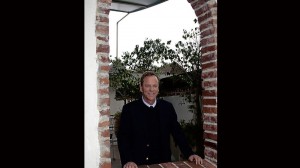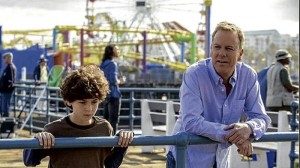Kiefer Sutherland on his new girl, TV show
LOS ANGELES — Kiefer Sutherland had a tough act to follow: Jane Fonda. “I wouldn’t even try,” Kiefer quipped as he sat down on the chair just vacated by the Hollywood icon.
Looking very preppy and sporting a new haircut, Kiefer had equally interesting topics to tackle: the latest on the film adaptation of “24”; his new series “Touch”; a part in Mira Nair’s new movie; the musician he has been dating; and his reaction when he saw his father, Donald Sutherland, and Julie Christie in one of cinema’s all-time sexiest scenes (Nicolas Roeg’s “Don’t Look Now”).
Excerpts from our interview:
After your incredible experience with “24,” you’re back on television. What made you decide to do this show?
I was doing a play on Broadway, “That Championship Season,” and enjoying myself. I had done a film (“Melancholia”) with Lars von Trier in Sweden and was getting ready to work with Mira Nair on “The Reluctant Fundamentalist”—two vastly different projects. I was having an amazing time with the variety of material that I was being given.
Article continues after this advertisementThen I was sent this script of “Touch” by Peter Chernin (producer). Suzan Bymel (another producer) sent me the script. I asked what it was about and she said, “Well, it’s a television show.” I said, “I don’t think I’m ready.” I want to go back to television— that I had never been discreet about. I loved my experience but it was only two years after “24.” I was just starting to get into a groove of other things to do. Then I read the script. I was about a third of the way through and going, “Oh s**t” because I really did like the piece. It was the first time I had ever read a script that I was actually enjoying but I was thinking, it could still fall apart. Maybe it won’t have a good ending or something but that didn’t happen. I fell in love with it more and more.
Article continues after this advertisementPrimarily it was the dynamic between the father and the son that interested me—the father of a special needs child whom he couldn’t touch and couldn’t speak to. He had to learn a new way to communicate. As a parent, I found that deeply moving. I responded to it very strongly. In the process of choosing anything, it has to resonate with you first.
If you start to try and guess what an audience is going to like or what other people are going to like, you can find yourself in a lot of trouble. I went with my gut. We went ahead and made it.
Can you talk about “24” the movie? Are you going to have a show with your father?
I am not going to make a pilot with my father. That’s the easiest one to answer.
We managed to make 100 episodes of “24” in the time that it took us to finally get a script for “24” the movie, which is my perspective on the development process in the feature film world. It’s a slight indictment. It’s been hard. One of the things that was really difficult is that we made close to 196 episodes of “24.” We covered an amazing amount of ground.
So to try and develop a feature film that is going to be as unique as we would like it to be, and yet maintain some kind of connection to the series, is very difficult. We finally got to that place last year where we had a script that we were really excited about. Then all of a sudden, we realized we had a very short timeframe left between getting that put together—getting the actors that we wanted, trying to get one of the very few directors that we were talking to, and just the physical requirements of pre-production feeding into production.
I wanted to make it so badly that I was pushing, pushing, pushing. I realized that I was putting us in a position where we would probably not make the best possible movie. So I had to finally step back and just go, we’re not going to get it in this slot …
So when is this project going to happen?
For six yeas now, I’ve been saying it’s going to happen. It will. If it doesn’t, it will be for no lack of effort on my part.
How did you spend your downtime between “24,” the film, the play and “Touch”?
Well… it was six months of the play. There were three months for the film. It took a year to adjust to not working everyday. Right before I started to work on “Melancholia,” which was the first project I did, I had actually just eased into not working. I took about a year to come down from all of that.
Did you play music during that time?
That’s the one thing that is constant. I do it late at night. That’s something I do to relax. I played some chess in the park in New York. I did a little bit of travelling. I got to spend a lot of time with my youngest daughter who just graduated from NYU. In that time, I had a second grandson who was born so there was a lot of family stuff.
One of the most important things about this show is recovering the importance of geography and going the distance. Can you talk about some of your more transformative trips in the past where you went someplace and you came back a different man?
The first trip I took was with a friend of mine, a singer-songwriter-artist named Jude. We both needed a break; we had been working very hard. We went to Hawaii. I was maybe 23. It was the first vacation I’d ever taken. We wanted to meet girls and have a good time. We had no idea that we had just gone to the marriage capital of the world. I remember we were both sitting by the pool. We were so white—everybody else was tan. We looked like kind of this gay couple that had gone there to die.
I looked at him and said, “We have to get out of here. This isn’t working out.” We couldn’t get a flight out for a couple of days. We hung out on the beach. There’s this film called “Continental Divide,” where John Belushi spends a lot of time in the mountains doing a story and he comes back a different man. At the end of two weeks in Hawaii, I literally felt like that guy.
Another trip was in Ireland. I couldn’t have been more than 27. It was the first trip I’d ever gone on by myself. Ireland is a magical place. I travelled all through the south. I realized I could actually pick up a backpack, go somewhere not knowing a single person and it would be all right. That was a very important trip for me.
Then there was this trip to the Czech Republic for work. The country had gotten out from underneath the USSR. There was joy in Prague that I had never seen in my life. That was the first place I had ever been where I saw people who weren’t going to take a single day for granted. Traveling is unbelievably important …
When you were younger and you saw your father in very steamy love scenes like in “Don’t Look Now,” how did you feel?
Pretty awkward. I remember I was watching “Don’t Look Now” and I was about 13 or 14. I was like, she’s (Julie Christie) turning me on. Maybe I could just block him out and you know, it’s awkward. You just keep wishing anybody else had been in it but your dad.
But I think that’s one of the greatest sequences I’ve ever seen in my life. I mean, Nicholas Roeg inter-cutting the banality of getting dressed and the perceived banality of that aspect of marriage, and with this desperate passion … the desperate clinging to the loss of a child in the couple’s lives—that was one of the most beautiful pieces of filmmaking I’ve seen. But I didn’t get that until I was about 20 because for the first few years, I just kind of went, “Oh God, that’s my dad.”
Can you talk about your film with Mira Nair?
It’s called “The Reluctant Fundamentalist,” about a young Pakistani man who comes to the United States on a Fulbright scholarship to Princeton where he ascends to the top of his economics class. He is acquired by the most prestigious hedge fund company in New York. He becomes the head of that company … and then the terrible events of 9/11 happen. The profiling begins and you start to watch Liev Schreiber as a CIA operative who interviews him. I play the man who absorbs him into the hedge fund company.
Who is the lucky person you are sharing your life with these days?
I tend not to talk much about that, but I have been dating a girl named Marnie Herald, a musician. She is a really beautiful person and kind. That’s all I like to say about that.
Are there going to be more little Kiefers?
I’ll tell you one thing. I have two grandsons. [With] a baby boy there’s like, sit down, stop moving and he just won’t. I’m with him for an hour and I think I deserve a medal. I need to take a nap. So I think that time has passed me because I’ve got my hands full enough as it is.
E-mail the columnist at [email protected]. Follow him at https://twitter.com/nepalesruben.

